Broken bondages from circumstances in your life occur not so much from trying to change the circumstances but changing the emphasis of your focus. Turning your eyes on Jesus can make “the things of this world grow strangely dim in the light of his glory and grace.”
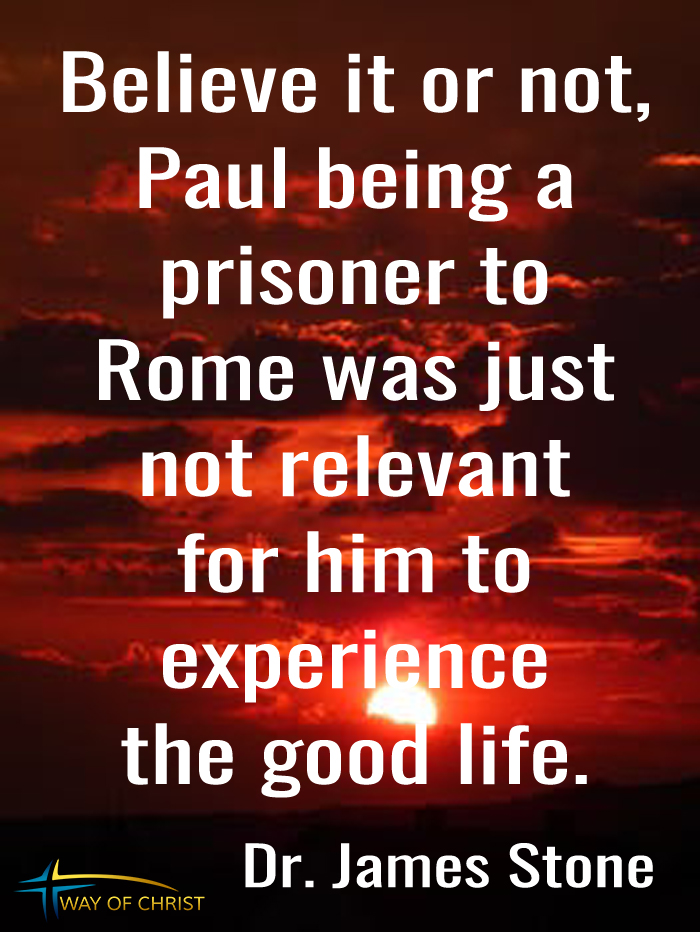
Life is really pretty simple. We experience our life either in the “Me” that I create or the “Me” that God creates. Mysteriously, the “Me” that we experience does not depend on the circumstances we face but on how we respond to those circumstances. Broken bondages, freedom from circumstances that tend to control our lives, are only experienced in the “Me” that God creates.
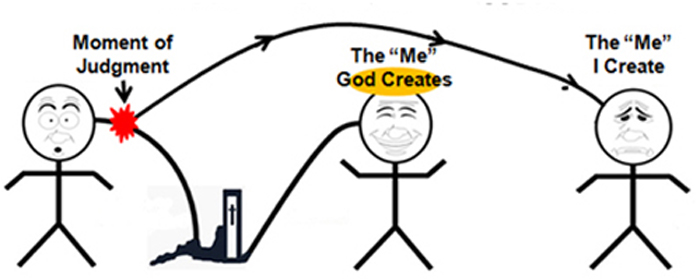
For example, in Paul’s letter to the Ephesians, after writing of the magnificence of Christ in Chapters 1, 2, and 3, he then emphasized, in Chapters 4, 5, and 6, the manifestation of Christ in people. After stating that the believer is set together with Christ in heavenly places (Eph. 2:6), Paul wrote of what we sometimes call the practical things of Christ in our lives. Through Christ, we are able to be truly spiritual people. In experiencing life, we can be people who are controlled by the heavenly realm not the earthly realm. Setting together in heavenly places with Christ describes the “Me” that God creates. It reveals how the broken bondages of being controlled by circumstances we face in life can be experienced.
Notice, how Paul started this final section (Chapters 4, 5, and 6) of the Ephesians letter, “I therefore, the prisoner of the Lord, beseech you that ye walk worthy of the vocation wherewith ye are called” (Eph. 4:1). Prisoner of the Lord? We often hear, if I could just get out of this marriage, if I could just get out of this job, if I could just make more money, or if I could just change this heart-wrenching circumstance. Does not that sound like we are in prison to something? Paul considered himself not to be a prisoner of his circumstance but only to be a prisoner of the Lord.
Paul is actually in prison to Rome when he stated, “I therefore, the prisoner of the Lord . . . .” He never ever talks about being a prisoner to Rome. Why? Believe it or not, being a prisoner to Rome was just not relevant for him to experience the good life. Whether he was in prison or not in prison, bad job or good job, or any physical thing he experienced was not relevant for Paul.
It would become relevant for Paul and for everyone, however, when the focus of life is placed on physicals things. What God desires to do for each of us is to move us from the “Me,” the fantasy me, that we create to the true “Me” that God creates. He wants to enable us to be set together with Christ in heavenly places and experience broken bondages which only occur on the physical realm.
Broken bondages occur when we truly experience the life that we have been invited to experienced.
Paul simply stated, “Therefore . . . walk worthy [appropriately] of the vocation [literal meaning, invitation] wherewith you are called” (Eph. 4:1). What is the invitation?” You have been invited to experience the unadulterated life of God which causes all bondages to be broken.
God has created you and has given you the opportunity to experience his glorious life even in this moment. Just walk appropriately. Some might ask, what is walking appropriately? It is not resisting the taking down process that occurs through the circumstances of life, the opportunity for a resurrection event. For it is only in and through resurrection events, we continually experience the nearness of the life of God. Broken bondages are always the result of the nearness of Jesus in our lives.
Paul would add in his Ephesians letter, “With all lowliness and meekness, with longsuffering . . .” (Eph. 4:2). I wonder why he would make that statement in this context? Is it not that Paul is saying that in every resurrection event there is going to be the need for some longsuffering (Gal. 5:22)? For when there is no longsuffering, we will always attempt to try to do something to fix or get out of the resurrection event. In other words, we will fall to the lust that is in our flesh (James 1:14).
Paul stated, “with longsuffering, forbearing one another in love” (Eph. 4:2). How can I say it? It looks like you are just going to have to “put up with it” (longsuffering). But, since this is occurring in the physical realm, God’s grace is sufficient to enable you to experience the good life regardless of the boss or any other physical circumstance. Understand, however, you do not have the capability, in yourself, to put up with the abuse (perceived or otherwise) that is being put upon you. The broken bondage of all physical circumstances can be experienced. The false accusations, the trial, the death, and the resurrection of Jesus amply demonstrates the sufficiency of God’s grace.
Broken bondages will always occur in the simple fact that Jesus, although crucified, is now alive.
Then, Paul wrote,
Endeavoring to keep the unity of the Spirit in the bond of peace. There is one body, and one Spirit, even as ye are called in one hope of your calling; One Lord, one faith, one baptism, One God and Father of all, who is above all, and through all, and in you all (Eph. 4:3-6).
To emphasize our point in experiencing resurrection events, the means of broden bondages, Paul said that there is “one Lord.” It means that the concept of the Lord in the New Testament is that he is the source of power of everything that happens in the world. Unfortunately, we often interpret Lord to mean that he is Lord because I make him Lord of my life. Or, as someone has said, concerning your life “If he is not Lord of all, then he is not Lord at all.” No, he is Lord regardless of what you do. He is the one that is making everything in this world to occur.
Paul stated, “One Lord, one faith, one baptism.” One baptism? Is Paul talking about water baptism, or is he talking about the baptism of the Holy Spirit? With John baptizing in water and Jesus baptizing in the Spirit, it sounds as if there are at least two baptism.
We get bogged down in our understanding because we dwell to much in the “Me” that we create. Paul says there is only one baptism. The one baptism of which Paul is referring is the baptism of a resurrection event that brings the nearness of Christ in our lives. Water baptism symbolizes it and Spirit baptism enables it, but there is only one way, the resurrection event, in which we experience broken bondages, the essence of life as we live life.
Then, Paul added in his Ephesians letter, “One God and Father of all, who is above all, and through all, and in you all. But unto every one of us is given grace according to the measure of the gift of Christ” (Eph. 4:6-7). This statement may be the most difficult to understand in how God works in the world. We ignorantly think that I have been given the measure of faith that makes me an apostle. I been giving the measure of faith that makes me a prophet. I been giving the measure of faith that makes me an evangelist, teacher, or pastor. No! It means you have been giving the measure of faith that enables you to experience the quality of the gift of life that you will experience in whatever is happening in each moment of your life. The quality of the gift of life that you will experience is in direct proportion to the measure of faith that has been extended to you. Bondages occur in our lives because of a lack of a measure of faith that would enable broken bondages to be experienced.
For example, the measure of faith you possess at a fork of the road dictates to you which path you will followed. The young man in the Proverbs 7 story can be forced to yield by the woman because that is the measure of faith, in this case the lack of adequate faith to do otherwise, that is given to him in that moment. He can do nothing else but give in to the woman.
Why does the young man keep listening to her, which will lead to his ultimate downfall? Because that is the measure of faith given to him in that moment and there is nothing else he can do. Why does this young man even go down the wrong street? Because that is the measure of faith he possesses as he comes to the entrance of the wrong street.
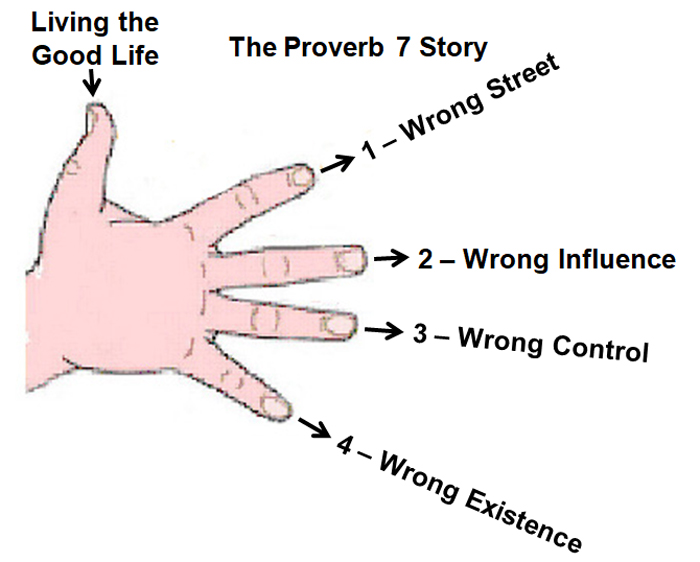
What we do at number 3, on the drawing, is occurring to the measure of faith given to us in that moment. When you are at number 3, you do not have the capability to say that you are not going with the woman. You are going to do what you are and what you are (stay with me) is what Christ is enabling you to do at that moment (the measure of faith you process). You have so frustrated grace, at this point, that an inadequate faith is being produced in your life. The broken bondages of the control of the women cannot occur.
What makes this difficult to understand is that when we are at 3 we think this is punishment for going down the wrong street in the beginning. But, 3 is not punishment for going down the wrong street. Mysteriously, what we have been calling punishment is really the pathway to redemption. This (3) is not punishment because we have done something at 2 or 1. 3, 2 and 1 is what God “will allow” to occur in order to show us that we have went down the wrong street. Just as sure as God produces the “Me” that he creates he is also at work in the “Me” that I create.
Broken bondages can be more readily experienced if we understand how bondages occur in our lives.
This is more clearly seen in Paul’s four steps to degradation and death in his Romans letter:
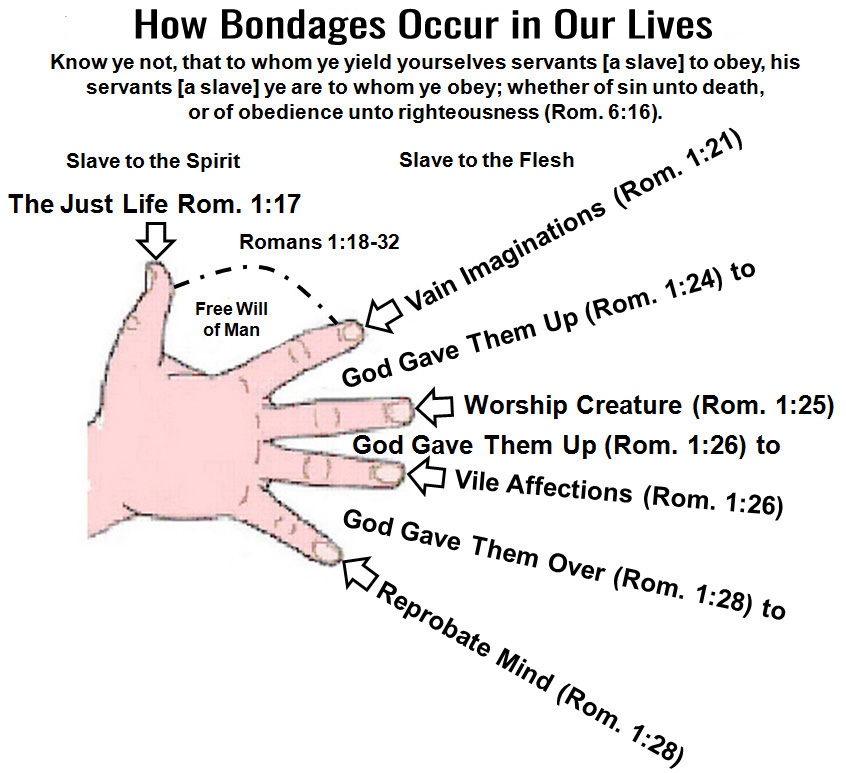
In each succeeding step downward, as Paul would say, God “gave them up” and “gave them over.” (Rom. 1:24, 26, 28). Or, as James would say, the grace that would enable them to stay at 1, 2, or 3 perisheth: “For the sun is no sooner risen with a burning heat, but it withereth the grass, and the flower thereof falleth, and the grace of the fashion of it perisheth . . .” (James 1:11). The condition at 1 will always produce the condition at 2, the condition at 2 will always produce the condition at 3, and the condition at 3 will always produce the condition at 4. Steps 1, 2, 3, and 4 will always produce the need to experience broken bondages.
Why does this occur as it occurs? Paul would say that “. . . sin, that it might appear sin, working in me . . . might become exceeding sinful” (Rom. 7:13). The downward path occurs that you will see the exceeding fullness of sin bringing you to the end of yourself in order that you will cry out to God to save you. Bondages will occur in order that we will turn to God for broken bondages to once again experience God as the essence of our lives.
The position at 1 is a picture of where you are at 1, 2 is a picture of where you are at 2, and 3 is a picture of where you are at 3. The picture of where you are at 3 is much more visual to the outside world. It is more visible because it is actually taking place in a relationship with other people.
The reason why the process works through 1 and 2 and 3 is God wants you to come to 4 where you will finally admit that something has happened back up at 3, 2, and 1. Because what happens at 3 and 4 is much more visible to others, it helps us to be more ready to accept something is wrong in this path of which we are traveling.
Broken bondages seem to occur only after bondages have reached their limits.
Looking closely at the statements of Paul in his Ephesians letter (“. . . One Lord, one faith, one baptism, One God and Father of all, who is above all, and through all, and in you all.”), it is easily seen that it mirrors the statement of Paul to the Romans, “For of him, and through him, and to him, are all things: to whom be glory for ever. Amen” (Rom. 11:36). Does all things mean all things? Paul would say in Romans 1,
Because that, when they knew God, they glorified him not as God, neither were thankful; but became vain in their imaginations, and their foolish heart was darkened . . . Wherefore God also gave them up to uncleanness through the lusts of their own hearts, to dishonour their own bodies between themselves . . . For this cause God gave them up unto vile affections . . . And even as they did not like to retain God in their knowledge, God gave them over to a reprobate mind, to do those things which are not convenient (Romans 1:21-28).
This downward road began when the people who knew God did not worship him as God and were not thankful. Because they did not worship him as God, Paul stated that “God gave them up.” To what did God give them up? He gave them up to something further down the road of degradation. Again, why does the creature begin to be worshiped more that the creator? Because God them up to do so. Or, God withdrew the controlling grace at 1 in order that 2 would occur. The measure of faith exhibited at 1 will always produce 2.
Paul stated that because they did not worship God and neither were thankful but worshiped the creature more than the Creator, God gave them up to vile affections. Because of these vile affections, the Scriptures stated that God gave them over to do those things that are not convenient. It means that they are not going to do the things that produce life but the things that produce death. God gave them up, God gave them up, and God gave them over. The need for broken bondages has run its course.
Ultimately, in the complete story of the degradation and death of the God-quality life, God gave man over to his vain imaginations (Rom. 1:21). All of the dreadful conditions and many acts of sin coming from a reprobate mind at the end of the road (Rom. 1:29-32) occur because God gave man over to his own lust and vainness. When our mind start rolling, ranting, and raving, it will produce 1, and 2, and 3. It will eventually brings us to doing those things which are not convenient for the good life. 1, 2, 3, and 4 are how God controls what is going on in the world. It seems that God, because man turns to worship himself, will bring us into bondages in order for us to understand that it is his power and his grace that allows us to experience the broken bondages of our lives.
Broken bondages are ultimately experienced by not allowing any bondage to begin.
What we must realize, when this mind starts its ranting, we must say, which cannot be done without God’s enabling power, I am not going down that road. It is nothing but a dead-end street. There is no use even beginning to think about that because it will only produce 1 and 2 and 3 and finally 4.
Unfortunately, this process of 1, 2, 3, and 4, is a process that occurs to often in our lives. As we keep going down and God keeps rescuing us, we finally begin to realize that God can be the only essence of our lives. The process of resurrection events keeps occurring in our life and we finally began to respond differently when the event begins. It can be represented by the following drawing.
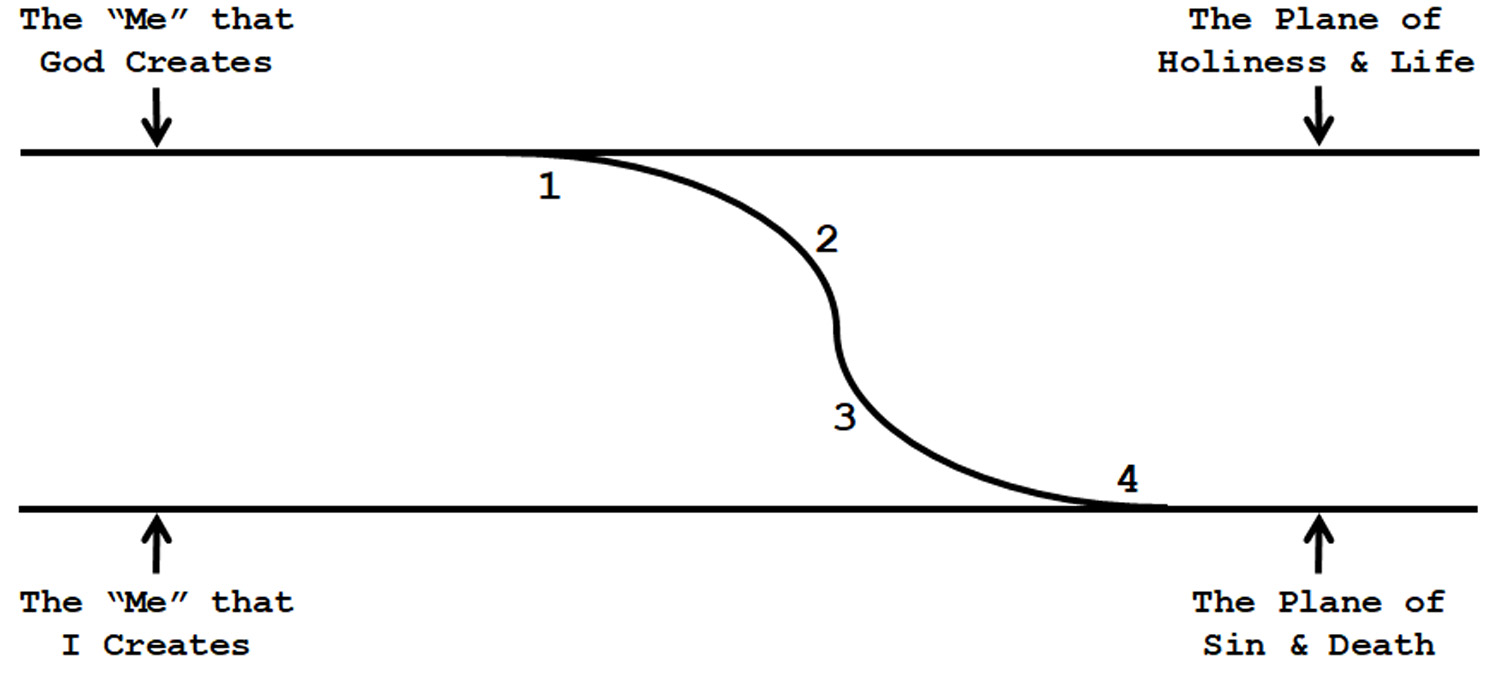
The more God is the essence of our lives we become immediately more aware when we begin to slip from the holiness plane. When life is being experienced down at the level of 3 an 4, it is evident to everyone. However, when you come off the holiness level at 1, since you have been sensitive to the Holy Spirit, you may be the only one who is aware of the slippage. As one who has been experiencing holiness, being more sensitive to Jesus, you do not have to travel very far down the road before you are aware that something is wrong.
Being more sensitive to the Spirit, any slippage from holiness will cause you to feel conviction. It will seem to you (at 1) as the same degree of conviction that others experience who have not been sensitive to the Spirit and are experiencing life at 4. You have not sunk to the level where you are angrily slapping people around, but you sense that you have begun to slide away from holiness.
When you are sensitive to the Spirit, experiencing 1 feels just as destructive as 4 to those who are not sensitive to the Spirit. When you are not sensitive to the Spirit, it seems always to take a 4 before God gets your attention. When Jesus is the real essence of your life, however, just a little slip from the plane of holiness and you begin immediately to realize that you are about to go down the wrong street.
There is no short-changing the hand of God. If you go down the wrong street 1, then 2 is always going to come of out 1. 3 is going to come out of 2. 4 is going come out of 3. Again, the path beginning at 1 is not as noticeable to the people around you. However, when you move far away from holiness and experience 4, your actions will become very visible to the people around you. The need to experience broken bondages become apparent to everyone.
Broken bondages will need to be experienced because power is given to something that actually has no power.
What is it that forces you to travel this downward road of destruction? In other words, does this power come from an outside source? James simply stated, “But every man is tempted, when he is drawn away of his own lust, and enticed. Then, when lust hath conceived, it bringeth forth sin: and sin, when it is finished, bringeth forth death”(James 1:14-15). Notice, this process of lust, enticement, sin, and death comes from within the temptation itself. There is no mentioning of an outside source of power in experiencing temptation.
In the Proverbs 7 story, when the young man went down the wrong street, the woman became very powerful in his life. It was not because she had any power over him from within herself, but she was given power by the young man listening to her. Eventually, she became so powerful that by “her much fair speech she caused him to yield.”
Paul also illustrated the power within temptation in Ephesians 1. He stated that when Christ died and was resurrected he was raised “far above all principalities, and power, and might, and dominion” (Eph. 1:21). With principality meaning a beginning, a commencement, the process of the downward road begins. Once it begins, what will it produce? Principality produces power. The original word for power is not force nor anything strong enough to make you obey. Again, power here is translated from the word meaning privilege. You have to give something the privilege to have power over you before it has any power.
Once you have given something the privilege to have power over you, it will control you, which is the meaning of the word might. Using the three words of principality, power, and might, Paul is simply stating that whatever you let begin in your life, it will eventually control you. Principality, power, and might will always bring dominion. Whatever you let begin in your life, give it the privilege to have power over you, and control you, it will eventually master you (original meaning for dominion).
Broken bondages will eventually need to be experienced when we begin to turn to something other than Jesus as the essence of our lives.
Paul is revealing the process of how we fall away from the plane of holiness, the “Me” that God creates. He is simply stating that the power of temptation is within the temptation process itself. The power of temptation does not come from any outside source. It comes because we attempt to make something other than Jesus to be first place in our life. Whatever that may be, we give it the privilege to have power over us. It then control us and eventually masters us.
Compare, in the following diagram, how the writers of both the Old Testament and the New Testament described the “Me” that I create and the consequences of that action. Is it a coincidence that these four steps, which Paul described as “the body of death” (Rom. 7:24) and James identified as “the course of nature” (James 3:6), are found in all the writings of the New Testament? Once again, the life that all of us experience will either be in the “Me” that God creates or the “Me” I create. Our self-esteem does not like it, but we are either a slave to God or a slave to sin (Rom. 6:13-16).
The Hand of God at Work in Life
(Follow each color down the fingers)
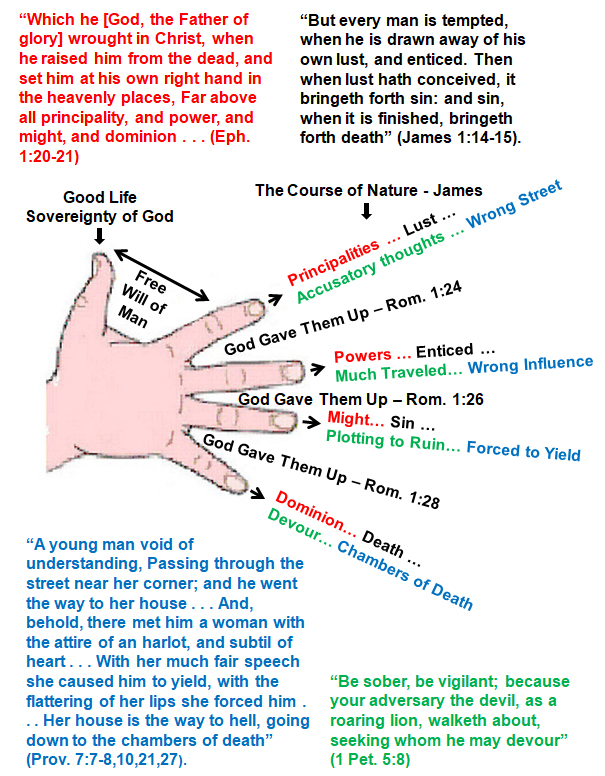
This process actually brings us to the end of ourselves, which does what? It enables us to be taken back to the heavenly realm when we cry out, “God save us.” The true cry for God to save us comes only from a mind that has or is in the process of losing its control. In desperation, the mind gives up its thinking that it can control life. Not because we have made a noble decision, but because we are brought to the end of our selves throwing up our hands in surrender. Thus, forced to surrender our perceived control, we are once again made to set together in heavenly places.
It is in a heavenly place that God wants us to dwell. It is the residence where God desire all of us to live. Does he want that to occur in the next life? No, right now! We are physical people in a physical world, but God has given us a marvelous invitation to experience his life now. The good news is that God has the capability to once again to make us set together in heavenly place.
Throughout the previous chapters, we have look at the mystery of temptation, the nature of temptation, and the power of temptation. So, now, we need to examine how we conquer that temptation. In perhaps, the most exciting chapter in the book, Chapter 5, we will examine how temptation is conquered in all of our lives.
Let us pray: Heavenly Father, life can become so simple and the simplicity of it is just to experience that which you have given us. We have been inbreathed by your Spirit. We are controlled, we are filled by your Spirit, and that Spirit never dies, it is eternal. Heavenly Father, as we go through the process of living life, experiencing life, again and again you bring the morning. You bring the freshness of the springtime, you bring the newness of the rose. Each time you bring those forth in our lives, which is the coming of your Son, the coming of Christ, there will be a restoration. There is always a renewal in experiencing the manifestation of your Son, Jesus Christ. It is your kingdom and it is your power and it is your glory forever. Let us once again experience the coming of the kingdom of God in our lives. Amen.






